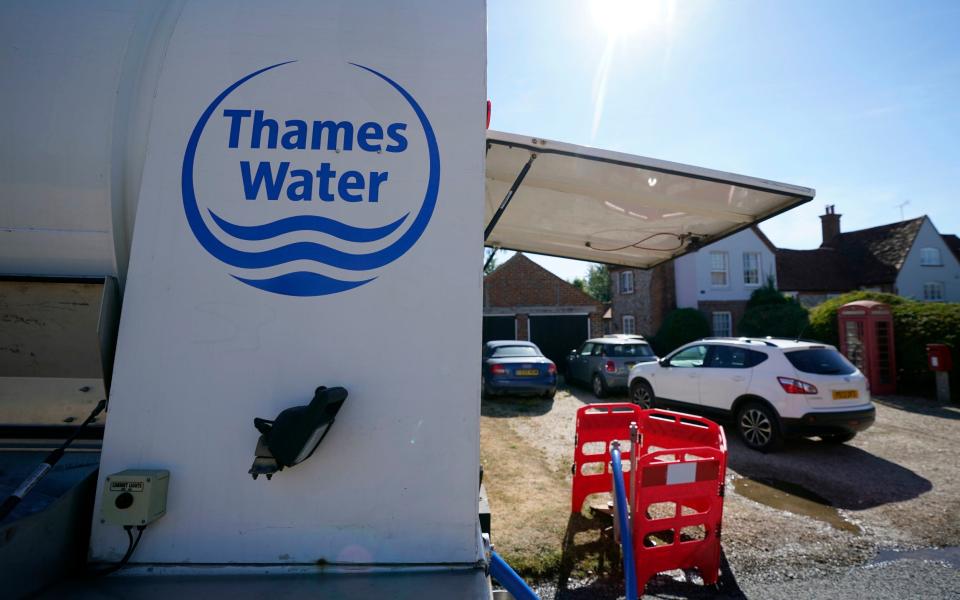Ofwat boss accused of not getting tough on leak targets

The boss of Ofwat has been accused of acting as an “apologist” for water firms as it emerged the regulator barely toughened leak targets in more than a decade.
Leaks across the sector have not fallen significantly since 2002 even though water companies have mostly hit their targets, it emerged on Tuesday, despite David Black, the water regulator’s chief executive, arguing it had been rigorous in holding companies to account.
Between 1994 and 2001, the volume of leaks dropped from five billion litres a day to around 3.3 billion. But since then, it has dropped down to only 3.1 billion.
During that period, water companies have largely stayed within their targets, which until 2019 were set on a cost-benefit analysis of whether fixing leaks would cost more than the value of the water lost.
Between 2007 and 2011, no targets on leaks were missed across all water companies in England and Wales.
Mr Black joined Ofwat in 2012 and previously worked as the regulator’s director of economics and a senior director before taking over as chief executive last year.
On Tuesday, he defended the regulator’s record on tackling leaks and agreed it needed to be “rigorous” and said it was “complex” to understand how the regulator was achieving its aims.
“We set challenging but achievable targets for water companies, leakage being one of them,” he told the BBC.

He acknowledged that Thames Water was meeting its targets, despite having 11,000 leaks across its system, and defended its record.
“They’re not in breach of their performance as we understand it at present,” he said. “Water companies have 340,000 kilometres of pipes underground. There are obviously risks of leaks right across the networks.”
Mr Black also defended the industry over the fact no new reservoirs have been built in 30 years. The regulator has been blamed for blocking some projects.
“The reason why there were no new reservoirs was simply that demand had actually fallen over that 20-year period,” he said.
When asked if those who think regulation has failed were wrong, Mr Black said: “We think there isn't sufficient account given for what’s actually happening in the system.
“We appreciate it is complex. It’s difficult to understand how we’re determined to drive better outcomes from company performance. When companies have fallen short, we will hold them to account.”
Since 2012, 19 companies have missed their targets on leakage, but only one enforcement action has been brought by the regulator, against Thames Water, which was fined £8.55m in 2018.
Several water company targets have remained largely static in the last decade, including South West Water, which was not expected to reduce its overall leakage levels at all between 2012 and 2020, according to Telegraph analysis of Ofwat data.
Southern Water was expected to cut leaks by just three per cent between 2012 and 2020, which it failed to do.
Between 2019 and 2020, several water companies saw their leak targets become more generous, including Thames, Southern and Yorkshire Water.
Ofwat said this is because of a change in the methodology of calculating leaks from the network and does not necessarily represent an overall increase in the volume of water lost.
When companies fail to meet their annual targets, the regulator requires them to cut bills. But if they meet or exceed their target, they can increase bills, even if the target has not changed from the previous year.
Between 2015 and 2020, companies faced financial penalties of about £70 million, but were able to take £30 million for achieving their leak targets.
Backlash over ‘insulting’ comments
Ofwat has set new targets since 2019 to reduce leakage by 16 per cent and says 75 per cent of companies are on track to reach those levels.
Stuart Singleton-White, the head of campaigns at the Angling Trust, said that Mr Black’s comments were “both disappointing and insulting”.
He said: “The reality is Ofwat are complicit in our broken water sector and seem to be acting as an apologist for a situation that it bears responsibility for creating.”
Emma Clancy, the chief executive of the Consumer Council for Water, said: “Most water companies are performing well against their regulatory targets but we are concerned that these do not go far enough. There is a gap between the best and worst performers that needs closing.”
An Ofwat spokesman said: “Over the last 20 years, we’ve imposed fines, penalties and secured spending commitments totalling over £339 million specifically for failure on leakage.
“This money has been used to improve performance, and where appropriate, money has been returned to customers at the expense of shareholders.
“Companies’ performance on leakage has been improving in recent years with leakage now at the lowest level since privatisation, and we will keep pushing them on this issue. Where they fail, we will act to hold them to account.”
Southern Water said: “We have a very large network – some 15,000km – and much of this is ageing which presents many challenges. We have pushed extra investment into tackling leakage and made 22,000 fixes last year alone. With new technology and extra resources, we are committed to meeting our current and future targets.”

 Yahoo Movies
Yahoo Movies 
